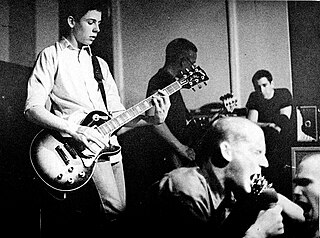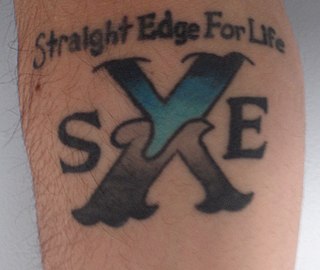Related Research Articles
Punk rock is a music genre that emerged in the mid-1970s. Rooted in 1960s garage rock, punk bands rejected the perceived excesses of mainstream 1970s rock. They typically produced short, fast-paced songs with hard-edged melodies and singing styles, stripped-down instrumentation, and often shouted political, anti-establishment lyrics. Punk embraces a DIY ethic; many bands self-produce recordings and distribute them through independent record labels.

"Do it yourself" ("DIY") is the method of building, modifying, or repairing things by oneself without the direct aid of professionals or certified experts. Academic research has described DIY as behaviors where "individuals use raw and semi-raw materials and parts to produce, transform, or reconstruct material possessions, including those drawn from the natural environment ". DIY behavior can be triggered by various motivations previously categorized as marketplace motivations, and identity enhancement.

Hardcore punk is a punk rock music genre and subculture that originated in the late 1970s. It is generally faster, harder, and more aggressive than other forms of punk rock. Its roots can be traced to earlier punk scenes in San Francisco and Southern California which arose as a reaction against the still predominant hippie cultural climate of the time. It was also inspired by Washington D.C. and New York punk rock and early proto-punk. Hardcore punk generally disavows commercialism, the established music industry and "anything similar to the characteristics of mainstream rock" and often addresses social and political topics with "confrontational, politically-charged lyrics."
Pop-punk is a rock music genre that combines elements of punk rock with pop or power pop. It is defined for its emphasis on classic pop songcraft, as well as adolescent and anti-suburbia themes, and is distinguished from other punk-variant genres by drawing more heavily from 1960s bands such as the Beatles, the Kinks, and the Beach Boys. The genre has evolved throughout its history, absorbing elements from new wave, college rock, ska, rap, emo, and boy bands. It is sometimes considered interchangeable with power pop and skate punk.
Ska punk is a fusion genre that mixes ska music and punk rock music together. Ska-core is a subgenre of ska punk that mixes ska with hardcore punk. Early ska punk mixed both 2 Tone and ska with hardcore punk. Ska punk tends to feature brass instruments, especially horns such as trumpets, trombones and woodwind instruments like saxophones, making the genre distinct from other forms of punk rock. It is closely tied to third wave ska which reached its zenith in the mid 1990s.
Queercore is a cultural/social movement that began in the mid-1980s as an offshoot of the punk subculture and a music genre that comes from punk rock. It is distinguished by its discontent with society in general, and specifically society's disapproval of the LGBT community. Queercore expresses itself in a DIY style through magazines, music, writing and film.
Outpunk enjoys the distinction of being the first record label entirely devoted to queer punk bands.
Westbeach Recorders was a recording studio in Hollywood, California famous for recording punk rock groups, such as Bad Religion, Avenged Sevenfold, NOFX, Rancid, The Offspring and Pennywise.

Singles Collection Volume 2 is a b-side and rarities compilation album released by Boston punk rock band Dropkick Murphys, on March 8, 2005. The album, which peaked at No. 26 and spent three weeks on the chart, contains songs released on singles, compilations and splits. Among the songs, two are alternate versions of songs previously released on Dropkick Murphys albums, five songs were written by the band and the rest were covers. The artists covered range from mainstream rock bands such as AC/DC and Creedence Clearwater Revival to influential punk bands such as Sham 69 and Cock Sparrer.
Skrewdriver were an English punk rock band formed by Ian Stuart Donaldson in Poulton-le-Fylde, Lancashire, in 1976. Originally a punk band, Skrewdriver changed into a white supremacist rock band after reuniting in the 1980s. Their original line-up split in January 1979 and Donaldson reformed the band with different musicians in 1982.

Lo-fi is a music or production quality in which elements usually regarded as imperfections in the context of a recording or performance are present, sometimes as a deliberate choice. The standards of sound quality (fidelity) and music production have evolved throughout the decades, meaning that some older examples of lo-fi may not have been originally recognized as such. Lo-fi began to be recognized as a style of popular music in the 1990s, when it became alternately referred to as DIY music.
Reset is a punk rock band formed in 1993 in Montreal, Quebec, Canada.
Neo-psychedelia is a diverse genre of psychedelic music that originated in the 1970s. Its practitioners drew from the unusual sounds of 1960s psychedelia, either updating or copying the approaches from that era. It initially developed as an outgrowth of the British post-punk scene, where it was called acid punk. After post-punk, neo-psychedelia flourished into a more widespread and international movement of artists who applied the spirit of psychedelic rock to new sounds and techniques.
0DFx is an American hardcore punk band.

Gravity is an underground independent record label from San Diego. It was formed in 1991 by Matt Anderson, a member of the influential underground band Heroin. It has been central in developing and promoting the "San Diego sound" – an idiosyncratic form of post-hardcore with loose, chaotic musicianship and vocals, initiated by Heroin, Antioch Arrow, and Clikatat Ikatowi, as well as Mohinder from the Bay Area and Angel Hair from Colorado. The sound is associated with the first wave of screamo, and the label played an important role in the development of post-hardcore in the 1990s. Gravity has also branched out into other forms of experimental or independent music, releasing seminal early works by Unwound, Black Dice, The Rapture, and a full-length from Man Is The Bastard.

Spiral Scratch is an EP and the first release by the English punk rock band Buzzcocks. It was released on 29 January 1977. It is one of the earliest releases by a British punk band. The EP is the only Buzzcocks studio release with original singer Howard Devoto, who left shortly after its release to form one of the first post-punk bands, Magazine.

Straight edge is a subculture of hardcore punk whose adherents refrain from using alcohol, tobacco, and other recreational drugs, in reaction to the excesses of punk subculture. For some, this extends to refraining from engaging in promiscuous sex, to following a vegetarian or vegan diet, and to not using caffeine or prescription drugs. The term straight edge was adopted from the 1981 song "Straight Edge" by the hardcore punk band Minor Threat.
Street punk is an urban working class-based subgenre of punk rock, which partly emerged as a rebellion against the perceived artistic pretensions of the first wave of British punk. Street punk emerged from the style of early Oi! bands such as Sham 69 and Cockney Rejects, and the Oi! bands that followed them such as Blitz, The Business and Angelic Upstarts. A key band in defining the aesthetic was The Exploited. However, street punk continued beyond the confines of the original Oi! form with bands such as GBH, Chaos UK, Discharge, The Anti-Nowhere League and Oxymoron. Street punks generally have a much more ostentatious and flamboyant appearance than the working class or skinhead image cultivated by many Oi! groups. Street punks commonly sported multi-coloured hair, mohawks, tattoos, heavily studded vests and leather jackets, and clothing, especially plaids, adorned with political slogans, patches, and/or the names of punk bands.
Post-punk is a broad genre of rock music that emerged in the late 1970s as musicians departed from the raw simplicity and traditionalism of punk rock, instead adopting a variety of avant-garde sensibilities and non-rock influences. Inspired by punk's energy and DIY ethic but determined to break from rock cliches, artists experimented with styles like funk, electronic music, jazz, and dance music; the production techniques of dub and disco; and ideas from art and politics, including critical theory, modernist art, cinema and literature. These communities produced independent record labels, visual art, multimedia performances and fanzines.
White power music is music that promotes white nationalism. It encompasses various music styles, including rock, country, experimental music and folk. Ethnomusicologist Benjamin R. Teitelbaum argues that white power music "can be defined by lyrics that demonize variously conceived non-whites and advocate racial pride and solidarity. Most often, however, insiders conceptualized white power music as the combination of those themes with pounding rhythms and a charging punk or metal-based accompaniment." Genres include Nazi punk, Rock Against Communism, National Socialist black metal, and fashwave.
References
- ↑ "Macweekly" (PDF). Fastnbulbous.com. April 6, 1990. p. 15. Retrieved 2022-03-27.
- ↑ Cindy Laufenberg (1 September 1994). 1995 Songwriter's Market: Where & How to Market Your Songs . Writer's Digest Books. pp. 223–. ISBN 978-0-89879-676-6.
- ↑ Kjersti Egerdahl (2010). Green Day: A Musical Biography. ABC-CLIO. pp. 28–. ISBN 978-0-313-36597-3.
- ↑ Dan Kimpel (2006). How They Made It: True Stories of How Music's Biggest Stars Went from Start to Stardom! . Hal Leonard Corporation. pp. 48–. ISBN 978-0-634-07642-8.
- ↑ Nielsen Business Media, Inc. (25 March 1995). Billboard. Nielsen Business Media, Inc. pp. 16–. ISSN 0006-2510.
- ↑ Angela M. Pilchak (October 2005). Contemporary Musicians: Profiles of the People in Music. Cengage Gale. ISBN 978-0-7876-8069-5.
- ↑ Matt Diehl (24 September 2013). My So-Called Punk: Green Day, Fall Out Boy, The Distillers, Bad Religion---How Neo-Punk Stage-Dived into the Mainstream. St. Martin's Press. pp. 65–. ISBN 978-1-4668-5306-5.